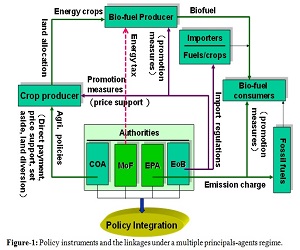
Chung-Huang Huang
Taiwan Research Institute, Taiwan
Title: Optimal policy integration for biofuels development and carbon reduction
Biography
Biography: Chung-Huang Huang
Abstract
In response to the pressure of greenhouse gas (GHG) emission reduction, the authorities in Taiwan have been initiating a number of plausible policy instruments such as set-aside program by the Council of Agriculture (COA), Renewable Energy Development Act by the Bureau of Energy (BoE), carbon fee by the Environmental Protection Administration (EPA) and energy tax by the Ministry of Finance (MoF). National development targets of such renewables as wind power, biomass, solar energy, etc., are also promulgated by BoE under the Ministry of Economic Affairs. Quite often the policy instruments could hardly harmonize with each other due to weak coordination among authorities and incomplete enforcement. Socially desirable policy integration is, therefore, urgently needed so as to achieve the development targets cost-effectively and to mitigate the impacts on the economy. Despite the supply side of biofuels, including production techniques and policy instruments, had been pervasively presented, the demand-side management is much less addressed. Transportation sector, as an example, attracts much attention because not only its GHG emission continues to grow, but also it is the major sector consuming biofuels. It appears, however, that the policy instruments applicable to the Ministry of Transportation in Taiwan is limited and weakly linked to the prevailing policy framework. This leads to a policy failure in promoting the use of biodiesel in transportation sector such that truck drivers refuse to use biodiesel and retail sellers refuse to buy in biodiesel from producers. This paper examines the farmer’s willingness to accept for the production switched from traditional crops (e.g., rice) to energy crops. The properties of equilibria in crop markets are also discussed on the basis of a general equilibrium model that involves intertemporal decisions of multiple principals and agents. Furthermore, the optimal integration of alternative policy instruments is proposed, in the hope that the overall efficiency of policy mix could be enhanced. Specific emphasis will be placed on the derivation of the consumer’s willingness to pay for biofuels in the transportation sector. Accordingly, the demand for transportation services will be integrated into a general equilibrium framework, represented, to address the optimal policy mix with multiple principals and agents. It is expected that the findings could deliver constructive policy recommendations to the authorities and make profound contribution to the literature.


